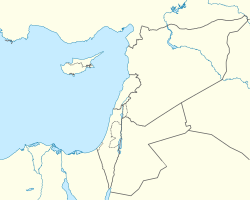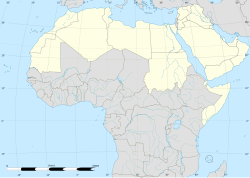Beirut
Beirut
بيروت Beyrouth | |
|---|---|
     Top to bottom, and left to right: Maronite Cathedral of Saint George (left) and Mohammad Al-Amin Mosque (right), Clock Tower at Nejmeh Square, Sahat al Shouhada, Sursock Museum, Pigeon Rocks of Raouché | |
 Flag  Seal | |
| Nickname(s): Paris of the East[1] | |
| Motto(s): | |
 Beirut Location of Beirut within Lebanon | |
| Coordinates: 33°53′13″N 35°30′47″E / 33.88694°N 35.51306°ECoordinates: 33°53′13″N 35°30′47″E / 33.88694°N 35.51306°E | |
| Country | Lebanon |
| Governorate | Beirut |
| Government | |
| • Governor | Marwan Abboud |
| • Mayor | Jamal Itani |
| Area | |
| • Capital city of Lebanon | 19.8 km2 (7.6 sq mi) |
| • Metro | 67 km2 (26 sq mi) |
| Population (2014)[2] | |
| • Capital city of Lebanon | c. 361,366 |
| • Metro | c. 2,200,000 |
| Demonym(s) | Beiruti |
| Time zone | UTC+2 (EET) |
| • Summer (DST) | UTC+3 (EEST) |
| Area code(s) | +961 (01) |
| ISO 3166 code | LB-BA |
| Patron Saint | Saint George |
| Website | www |
Beirut (/beɪˈruːt/ bay-ROOT;[4] Arabic: بيروت, romanized: ![]() Bayrūt) is the capital and largest city of Lebanon. As of 2014, Greater Beirut has a population of 2.2 million,[5] which makes it the third-largest city in the Levant region. The city is situated on a peninsula at the midpoint of Lebanon's Mediterranean coast. Beirut has been inhabited for more than 5,000 years, and was one of Phoenicia's most prominent city states, making it one of the oldest cities in the world. The first historical mention of Beirut is found in the Amarna letters from the New Kingdom of Egypt, which date to the 15th century BC.
Bayrūt) is the capital and largest city of Lebanon. As of 2014, Greater Beirut has a population of 2.2 million,[5] which makes it the third-largest city in the Levant region. The city is situated on a peninsula at the midpoint of Lebanon's Mediterranean coast. Beirut has been inhabited for more than 5,000 years, and was one of Phoenicia's most prominent city states, making it one of the oldest cities in the world. The first historical mention of Beirut is found in the Amarna letters from the New Kingdom of Egypt, which date to the 15th century BC.
Beirut is Lebanon's seat of government and plays a central role in the Lebanese economy, with many banks and corporations based in the city. Beirut is an important seaport for the country and region, and rated a Beta + World City by the Globalization and World Cities Research Network.[6] Beirut was severely damaged by the Lebanese Civil War, and its cultural landscape underwent major reconstruction.[7][8][9]
Names[]
The English name Beirut is an early transcription of the Arabic name Bayrūt (بيروت). The same name's transcription into French is Beyrouth, which was sometimes used during Lebanon's French occupation. The Arabic name derives from Phoenician be'rūt (


